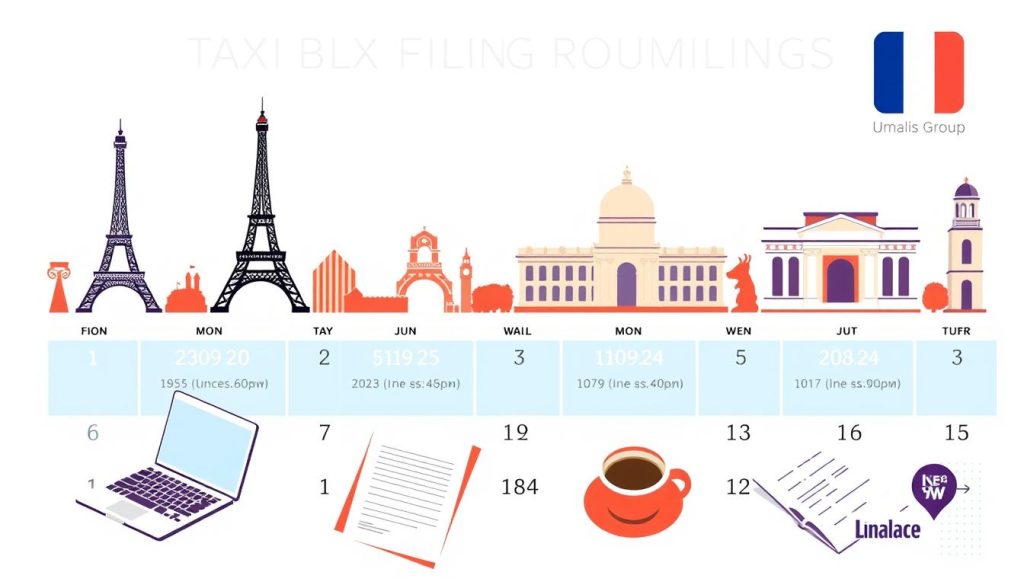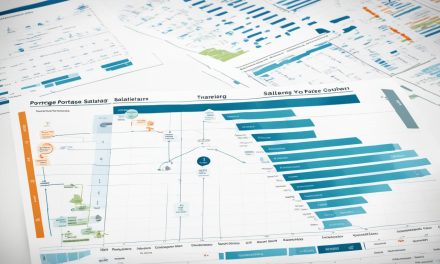I remember the excitement when I started freelancing in France. The idea of building a business in such a beautiful place was thrilling. But, I quickly learned about the tax rules for American freelancers here.
Dealing with foreign tax rules can be both exciting and scary. French income tax rates go from 0% to 45%. We aim to help you understand these rules so you can focus on your work without worry.
Table of Contents
Key Takeaways
- France has progressive income tax brackets that can reach up to 45%.
- Contribution exceptionnelle sur les hauts revenus applies to higher incomes.
- Self-employment in France involves social security contributions based on activity type.
- US-France tax treaties and totalization agreements help reduce double taxation.
- Early planning brings peace of mind at each annual filing deadline.
Understanding the French Tax System
Nous aidons les freelances à mieux comprendre les taxes en France. J’ai découvert l’ampleur des obligations fiscales, surtout pour les expats américains. Environ 12% des travailleurs français sont indépendants, incluant freelancers et entrepreneurs.
Comprendre les règles fiscales rend la vie plus facile. Notre objectif est de clarifier ces concepts pour protéger vos intérêts. Il est essentiel de connaître les charges sociales et l’impôt sur le revenu, car les taux changent selon les revenus et l’activité.
Overview of French Taxes
Les taxes en France touchent plusieurs domaines :
- Income Tax géré selon différents barèmes progressifs
- Social Contributions pour financer la sécurité sociale
Key Tax Authorities in France
La Direction Générale des Finances Publiques (DGFiP) supervise la majorité des prélèvements. Les bureaux locaux vérifient vos déclarations. Nous conseillons d’utiliser le portail impots.gouv.fr pour déclarer vos revenus.
| Tax Year | Income Bracket (€) | Tax Rate |
|---|---|---|
| 2023 | Up to 10,777 | 0% |
| 2023 | 10,778–27,478 | 11% |
| 2023 | 27,749–78,570 | 30% |
| 2023 | 78,571–168,994 | 41% |
| 2023 | 168,995+ | 45% |
| 2024 | Up to 11,294 | 0% |
| 2024 | 11,295–28,797 | 11% |
| 2024 | 28,798–82,341 | 30% |
| 2024 | 82,342–177,106 | 41% |
| 2024 | 177,107+ | 45% |
Resident vs. Non-Resident Tax Status
Many professionals ask about their tax status in France. I felt the same way when I moved here. It’s important to know if you’re a resident or non-resident because it affects your taxes.
We aim to clear up these differences. This way, you can focus on your work without confusion. Our goal is to help you understand the basics.
Determining Your Tax Residency
How long you stay in France matters. So does where your business is based. Your personal and business ties can decide if you’re a resident. This affects how your income is taxed.
Implications of Residency on Tax Obligations
Residents pay taxes on all their income. Non-residents only pay on income earned in France. This is key for those working in France and abroad.
| Status | Tax Focus |
|---|---|
| Resident | Worldwide Income |
| Non-Resident | French-Sourced Income |
Income Tax for Freelancers
Freelancing in France can open up new opportunities. It’s important to follow local rules while keeping your freedom. I always set aside some money for taxes.
Over the last ten years, the number of independent workers in France has grown by 92%. Many ask about tax rules for American freelancers in France. This is because they want a smooth transition.
Tax Rates for Freelancers in France
Tax rates change every year. Newcomers might choose the micro-enterprise regime if their income is under €176,200 for business or €72,600 for services. Income up to these amounts is taxed from 0% to 45%, depending on the bracket.
Non-resident freelancers must pay at least 20% on income up to €25,710. A higher rate applies after that. You can also choose a flat-rate payment, combining social contributions and income tax in one step.
Filing Requirements for Freelancers
Keeping accurate records makes filing easier. Filing on time avoids penalties and keeps your finances stable. Knowing the tax rules for American freelancers in France is key to filing correctly.
| 2024 Income Bracket (EUR) | Tax Rate |
|---|---|
| Up to 11,294 | 0% |
| 11,295 – 28,797 | 11% |
| 28,798 – 82,341 | 30% |
| 82,342 – 177,106 | 41% |
| 177,107 and above | 45% |
Self-Employment Taxes
We advise self-employed folks to plan for taxes in France and the U.S. It’s easier when you know the rules. In the U.S., you must pay taxes if you earn at least $400 from self-employment. This includes Medicare and Social Security.
Overview of Social Security Contributions
Freelancers in France must pay for their social charges. These cover healthcare, retirement, and more. U.S. citizens abroad are taxed on all income, including what they earn abroad. This means you’ll pay 15.3% self-employment tax at home.
Even if you qualify for the foreign earned income exclusion in France, your net earnings are taxable. Some use totalization agreements to avoid double payments. But, it’s key to check if you’re covered in both places.
Differences Between Employees and Freelancers
Employees have taxes taken out of their paychecks. Freelancers must handle their own taxes, which can be tough. It’s vital to budget for these taxes to avoid stress at the end of the year.
We suggest regularly checking your compliance. This way, you can have peace of mind, whether you follow U.S. or French tax rules.
Double Taxation Agreements
Taxes can be a big problem when you work in another country. If you earn money in France but live in the U.S., you might wonder who gets to collect taxes. The tax treaty between the U.S. and France helps figure out where to report business profits, dividends, or royalties.
Agreement Between France and the U.S.
Every freelancer should look into this treaty to know who to pay taxes to. It makes sure you don’t pay taxes twice on your work income. But, you might have to pay 17.2% in social charges in France. Also, some U.S. states might not follow the treaty, so check their rules too.
Avoiding Double Taxation on Income
Tax credits and deductions can help with both American and French taxes. We suggest preparing all your proof of residence and income carefully. If you have foreign bank accounts, like retirement funds, you might need to report them in France. Keeping track of these details can help you avoid stress.
| Tax Treaty Aspect | Key Details |
|---|---|
| Reduced Rates | May apply to specific types of income like certain royalties or dividends |
| Saving Clause | Prevents U.S. citizens from avoiding taxation on U.S.-sourced income |
| Documentation | Essential for claiming relevant treaty benefits and credits |
Value Added Tax (VAT) Considerations

Taxes can seem overwhelming. I remember trying to understand the French VAT rules for US freelancers in France. It was all about keeping track of invoices, rates, and reporting rules. We want to help you focus on your work, not get lost in taxes.
Understanding VAT in France
VAT is charged on most goods and services at 20%. Some items have lower rates of 10% or 5.5%. Keeping good records is key. It’s smart to use trusted resources for clear advice. Detailed logs help avoid mistakes in your financial reports.
| Rate | Percentage | Example of Application |
|---|---|---|
| Normal Rate | 20% | Most professional services |
| Intermediate Rate | 10% | Certain restaurant services |
| Reduced Rate | 5.5% | Essential goods like basic food |
VAT Registration Requirements for Freelancers
Freelancers must register if their annual sales hit 34,600 euros for services or 86,900 euros for goods. This ensures you follow VAT rules. Keep an eye on your earnings to avoid late penalties. We’re here to help with the self-employment tax for US freelancers in France. For more tips, check out our useful advice.
Record Keeping and Documentation
We think great documentation makes tax season easier and helps us relax. I’ve seen how organized bank statements and clear invoices help when deadlines are near.
Essential Records for Tax Purposes
Receipts, contracts, and logs are key for French tax authorities. The Commercial Code says we must keep income and expense proof for ten years. The General Tax Code also stresses the need for clear accounting, ensuring every payment is well-documented. Our team follows local laws and knows the IRS rules for US citizens abroad.
- Invoices with itemized details
- Bank statements and payment slips
- Commercial contracts and agreements
Tools for Efficient Record Keeping
Cloud apps or accounting software help us track money in real time. I like tools that remind us when it’s time to file, avoiding last-minute stress. Some even convert currencies for international payments.
| Document Type | Retention Period | Legal Reference |
|---|---|---|
| Accounting Ledgers | 10 Years | Art. L123-22 C. Com. |
| Invoices | 10 Years | Art. 54 CGI |
| Bank Documents | 10 Years | French Tax Code |
Deductions and Expenses for Freelancers
Beaucoup de professionnels indépendants veulent réduire leur impôt. Ils gardent des reçus pour chaque déplacement ou repas d’affaires. Cela les aide à éviter des surprises lors de la déclaration annuelle.
Les chiffres de l’INSEE montrent que plus de quatre millions de micro-entreprises non-agricoles prospèrent en France. Elles offrent plus de liberté aux entrepreneurs.
Les seuils de ventes pour le régime micro-entreprise varient. Ils vont de 188,700 € pour certaines activités à 77,700 € pour les services. Abillio aide à facturer dans 158 pays pour gérer les finances facilement.
Common Deductible Expenses
Il y a des frais qui peuvent réduire l’impôt. Voici quelques exemples :
- Home office et fournitures
- Déplacements et hébergements professionnels
- Repas d’affaires
- Frais d’adhésion à des organisations professionnelles
How to Claim Deductions
Les démarches varient selon le statut. Le régime micro-entreprise offre un abattement forfaitaire. Le régime standard demande des déductions détaillées, nécessitant une comptabilité précise.
| Regime | Deduction Method | Key Points |
|---|---|---|
| Micro-Entreprise | Flat-Rate Allowance | Aucune déclaration de TVA à fournir |
| Standard Freelance | Itemized Deductions | Suivi précis des dépenses requises |
Tax Filing Deadlines in France

Knowing the right time to file taxes is key for freelancers. It helps keep your work and money safe. We’ve learned that deadlines change based on your department number. This is a big deal for anyone who wants to follow the rules.
Being organized helps you plan your finances better. It also makes sure you have all your documents ready. This way, you can relax and avoid last-minute rushes. We advise you to plan ahead and mark important dates on your calendar.
Key Dates for Freelancers
In France, filing times depend on your department. If you send your taxes by mail, it must arrive by May 22. But, if you file online, the deadline changes based on where you are:
| Deadline | Departments |
|---|---|
| May 25 | 1–19 |
| June 1 | 20–54 |
| June 8 | 50–101, Overseas |
Penalties for Late Filings
Missing the deadline can cost you 10% of your taxes, plus interest. We suggest checking the official calendar every year to avoid stress. Filing on time keeps your freelance work going smoothly.
Working with Tax Professionals
Nous savons que l’assistance spécialisée peut changer la gestion fiscale. Gérer seul les déclarations peut être compliqué. Un spécialiste peut trouver des opportunités et respecter les délais.
Benefits of Hiring a Tax Advisor
Les entrepreneurs découvrent souvent la complexité de l’auto-entrepreneuriat. Un tax advisor expérimenté simplifie les formalités. Il applique les accords internationaux, comme le taux de 15.3% pour la self-employment tax.
Cette expertise réduit le risque d’omission. Elle aide à éviter de payer deux fois la sécurité sociale. Cela grâce aux conventions en vigueur.
Finding the Right Tax Professional
Il faut vérifier les témoignages clients et la réputation. Cherchez des experts avec une bonne expérience avec les freelancers américains en France. Un bon dialogue sur vos revenus et obligations légales est essentiel.
| Filing Category | Threshold | Foreign Reporting | Key Rate/Exclusion |
|---|---|---|---|
| Self-Employed | $400 | FBAR if > $10,000 | 15.3% US Tax |
| Single Filer | $13,850 | Bona Fide Residence Tests | $120,000 FEIE |
| Married Filing Jointly | $27,700 | FATCA if > $400,000 | US-France Totalization |
Managing Currency Exchange and Taxes
Shifting exchange rates can make tax calculations tricky. I keep a close eye on every transaction. This way, I avoid surprises when tax time comes.
For those in France over 183 days, it’s important to know your tax obligations. Keeping track of exchange rates is key.
Currency Conversion Implications
Consistent documentation helps spot any errors. You can use an official average rate for the year. Or, track exact rates on the day you get paid.
Here are some helpful tips:
- Record daily rates for major invoices
- Use trusted software or spreadsheets
- Retain proof of exchange for official reviews
Reporting Foreign Income
Dealing with taxes in different places can be complex. American freelancers in France must file in both countries. French residency starts if you spend more than half the year there.
For more on this, check out this resource for Americans in France. Accurate currency conversions are essential. They help ensure your earnings are reported correctly, avoiding costly errors.
Impact of Local Taxes
Freelancers often overlook local taxes while focusing on national ones. I once had to rush when a local tax bill arrived unexpectedly. It changed my financial plans. We tell our community to watch out for all taxes to keep their business stable.
Check out our comprehensive guide for tips on budgeting.
Understanding Local Tax Obligations
Freelancers pay extra based on their location. Cotisation Foncière des Entreprises (CFE) covers local business activity. Taxe d’habitation applies to properties occupied on January 1. Any American earning over $400 in net self-employment income must follow U.S. rules, showing the need for dual compliance.
Municipal Taxes Freelancers Should Know
Local taxes fund community services. Rates differ by area, so it’s key to budget for possible increases. Property value, notional rent, and local decisions affect these rates. Some see tax hikes as high as 60% from before. Planning ahead can avoid financial shocks.
Resources for American Freelancers in France
Finding help when starting a freelance career abroad can be tough. I found tools that made tax procedures clear and saved time. Here, we share key resources to help you make informed decisions and ensure your professional safety.
Government Resources and Websites
Official sites like impots.gouv.fr and service-public.fr are great for tax and legal info. The micro-entreprise regime is detailed on URSSAF pages for those earning under €77,000. For higher earnings, Régime Réel references are found through national tax forums.
American experts, such as Taxes for Expats or Online Taxman, can help with complex cross-border tax filings. They also assist with the Foreign Earned Income Exclusion.
Community Support and Networking
Talking to other freelancers speeds up learning. Chambers of commerce host meetups, and the American Chamber of Commerce in France offers activities for newcomers. Hearing from others gives you the confidence to tackle local processes.
| Resource | Purpose |
|---|---|
| Impots.gouv.fr | Official site for French tax details |
| URSSAF | Social charges and micro-entreprise guides |
| American Chamber of Commerce in France | Networking events for cross-border professionals |
| Taxes for Expats | Expert assistance for U.S. tax requirements |
Planning for Future Tax Liabilities
We urge American freelancers in France to watch for tax rate changes and new taxes. Tax rates can go from 0% to 45%. Wealth tax might hit you if your property value is over €1.3 million. Saving money early can protect your freelance work from unexpected costs.
Keeping track of capital gains or property charges is key. Monthly forecasts help when your income goes up. A small savings can help cover the gap between your earnings and social security payments.
Strategies for Tax Planning
We suggest making a simple plan for withholding or estimated payments. Having different income sources can spread out your taxes. Some freelancers talk to experts to see if family allowances or education credits can reduce their taxes.
Importance of Ongoing Tax Education
Taxes change every year. Surcharges can pop up, and exemptions can grow. Keeping up with the latest rules helps you stay on track. We update our tips as new rules come out. This way, you can keep your independence, maintain social coverage, and keep growing professionally.
FAQ
How do I begin addressing tax considerations for American freelancers in France?
Start by understanding both French and U.S. tax rules. In France, you’ll face income tax and possibly VAT. In the U.S., you have reporting duties. Knowing where and when to file is key to avoid penalties.
Do I stil need to pay US expat taxes in France?
Yes, as a U.S. citizen, you must file a U.S. tax return. The foreign earned income exclusion for American freelancers in France might lower your U.S. taxes. But, you’ll also have French tax duties. It’s wise to get advice on how these rules apply to you.
What are the main tax implications for US citizens working in France who are considered residents?
French tax residents report all income to France. The U.S. may also want you to report it. The tax treaty between the US and France can prevent double taxation. You’ll need to file the right forms with the IRS and France’s impots.gouv.fr.
How do I determine my tax residency status under tax residency rules for American freelancers in France?
Residency depends on where you live, how much time you spend in France, and your work base. Freelancers who work mostly here or live here most of the year are often residents. Confirming residency early helps you know which tax returns to file.
Do I need to worry about self-employment tax for US freelancers in France if I pay into the French system?
You might have U.S. self-employment tax duties, but the U.S.-France totalization agreement can help. It ensures you’re not paying twice for social security. We recommend checking with French authorities and the IRS. Properly coordinating payments was a big relief for me.
How does the tax treaty between the US and France help reduce double taxation?
The treaty explains which country taxes what income, like business profits or dividends. It simplifies tax implications for US citizens working in France. But, it requires detailed paperwork. Following the treaty rules helped me focus on my work, not taxes.
When must I register for VAT in France if I’m a freelancer?
VAT registration is based on your annual sales. If you exceed certain amounts, you must collect and pay VAT. We advise tracking your income closely. I found scheduling reminders for turnover checks helpful to avoid penalties.
Which IRS requirements for US citizens working abroad should I keep in mind?
Key requirements include filing a tax return (Form 1040), reporting foreign bank and financial accounts (FBAR), and Form 2555 for the foreign earned income exclusion for American freelancers in France. Double-check both French and U.S. filing deadlines to stay compliant.
Can I deduct my business expenses under French tax laws?
Yes, you can deduct business expenses like home-office costs, professional subscriptions, and travel. We recommend keeping detailed records. Consistent tracking makes filing easier.
How can I prepare for future tax liabilities as a freelancer in France?
Anticipate tax rate or regulation changes in France and the U.S. to adjust your budget. Set aside funds for social contributions, tax increases, or new levies. Proactive planning helped me maintain stability and grow my business, even with tax rule changes.





